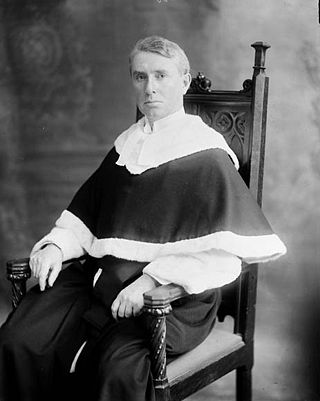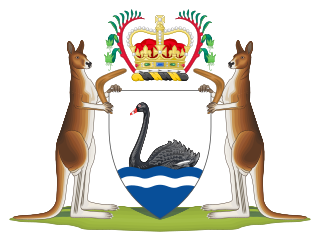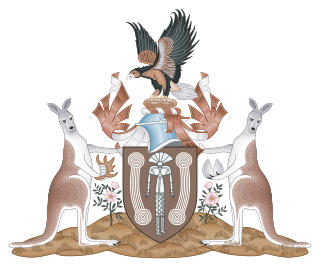
A summary offence or petty offence is a violation in some common law jurisdictions that can be proceeded against summarily, without the right to a jury trial and/or indictment.
The Courts of England and Wales, supported administratively by His Majesty's Courts and Tribunals Service, are the civil and criminal courts responsible for the administration of justice in England and Wales.

A justice of the peace (JP) is a judicial officer of a lower court, elected or appointed by means of a commission to keep the peace. In past centuries the term commissioner of the peace was often used with the same meaning. Depending on the jurisdiction, such justices dispense summary justice or merely deal with local administrative applications in common law jurisdictions. Justices of the peace are appointed or elected from the citizens of the jurisdiction in which they serve, and are usually not required to have any formal legal education in order to qualify for the office. Some jurisdictions have varying forms of training for JPs.

The term magistrate is used in a variety of systems of governments and laws to refer to a civilian officer who administers the law. In ancient Rome, a magistratus was one of the highest ranking government officers, and possessed both judicial and executive powers. In other parts of the world, such as China, magistrate is a word applied to a person responsible for administration over a particular geographic area. Today, in some jurisdictions, a magistrate is a judicial officer who hears cases in a lower court, and typically deals with more minor or preliminary matters. In other jurisdictions, magistrates are typically trained volunteers appointed to deal with criminal and civil matters in their local areas.

Judiciary of Malaysia is largely centralised despite Malaysia's federal constitution, heavily influenced by the English common law, as well as Islamic jurisprudence.
A resident magistrate is a title for magistrates used in certain parts of the world, that were, or are, governed by the British. Sometimes abbreviated as RM, it refers to suitably qualified personnel—notably well versed in the law—brought into an area from outside as the local magistrate, typically to be the guiding hand amongst other lay magistrates.

The Supreme Court of the Australian Capital Territory is the highest court of the Australian Capital Territory (ACT). It has unlimited jurisdiction within the territory in civil matters and hears the most serious criminal matters.

The District Court of New South Wales is the intermediate court in the judicial hierarchy of the Australian state of New South Wales. It is a trial court and has an appellate jurisdiction. In addition, the Judges of the Court preside over a range of tribunals. In its criminal jurisdiction, the Court may deal with all serious criminal offences except murder, treason and piracy. The Court's civil jurisdiction is generally limited to claims less than A$1,250,000.

The Local Court of New South Wales is the lowest court in the judicial hierarchy of the Australian state of New South Wales. Formerly known as the Court of Petty Sessions and the Magistrates Court, there are more than 160 branches across New South Wales where the Local Court has jurisdiction to deal with the majority of minor civil and criminal matters.

The District Court of Western Australia is the intermediate court in Western Australia. The District Court commenced in 1970, amid additional stress placed on the existing Magistrates Court and Supreme Court due to the increasing population of Western Australia. At its inception, the Court consisted of four judges: Sydney Howard Good, William Page Pidgeon, Desmond Charles Heenan and Robert Edmond Jones.

In England and Wales, a magistrates' court is a lower court which hears matters relating to summary offences and some triable either-way matters. Some civil law issues are also decided here, notably family proceedings. In 2010, there were 320 magistrates' courts in England and Wales; by 2020, a decade later, 164 of those had closed. The jurisdiction of magistrates' courts and rules governing them are set out in the Magistrates' Courts Act 1980.
Summary jurisdiction, in the widest sense of the phrase, in English law includes the power asserted by courts of record to deal brevi manu with contempts of court without the intervention of a jury. Probably the power was originally exercisable only when the fact was notorious, i.e. done in presence of the court. But it has long been exercised as to extra curial contempts.

The High Court of Singapore is the lower division of the Supreme Court of Singapore, the upper division being the Court of Appeal. The High Court consists of the chief justice and the judges of the High Court. Judicial Commissioners are often appointed to assist with the Court's caseload. There are two specialist commercial courts, the Admiralty Court and the Intellectual Property Court, and a number of judges are designated to hear arbitration-related matters. In 2015, the Singapore International Commercial Court was established as part of the Supreme Court of Singapore, and is a division of the High Court. The other divisions of the high court are the General Division, the Appellate Division, and the Family Division. The seat of the High Court is the Supreme Court Building.

The Supreme Court of Norfolk Island is the superior court for the Australian territory of Norfolk Island. It has unlimited jurisdiction within the territory in civil matters and hears the most serious criminal matters. It also has jurisdiction over the Coral Sea Islands Territory. All matters are heard before a single judge, including appeals from the Court of Petty Sessions. In the Australian court hierarchy, it is one of eight state and territory Supreme Courts having unlimited jurisdiction in their respective parts of Australia. Appeal lies to the Federal Court of Australia, from which an appeal by special leave can be made to the High Court of Australia.

The Magistrates Court of South Australia is the lowest level court in the state of South Australia. The Magistrates Court, then known as the Court of Petty Sessions, was established in 1837, by the Court of Sessions Act 1837. It has both original and appellate jurisdiction and hears matters specified in the Magistrates Court Act 1991 (SA).
The District Court is the lowest court in the Irish court system and the main court of summary jurisdiction in Ireland. It has responsibility for hearing minor criminal matters, small civil claims, liquor licensing, and certain family law applications. It is also responsible for indicting the accused and sending them forward for trial at the Circuit Court and Central Criminal Court.

The Magistrates Court of Western Australia is the first tier court in Western Australia, a state of Australia. It has jurisdiction in respect of criminal and civil matters, as well as a range of administrative matters. The court came into existence in May 2005 and was the result of the amalgamation of the Court of Petty Sessions of Western Australia, Small Claims Tribunal of Western Australia, and the Local Court of Western Australia.

The Local Court of the Northern Territory is one of two levels of court in the Northern Territory of Australia. It has jurisdiction in civil disputes up to A$250,000, and in criminal cases in the trial of summary offences, and also deals with preliminary matters for indictable offences which are then heard by the Supreme Court of the Northern Territory. There are local courts held in Darwin, Alice Springs, Katherine, Tennant Creek, and some "bush courts" in remote locations.

The Magistrates Court of the Australian Capital Territory is a court of summary jurisdiction that deals with the majority of criminal law matters and the majority of small civil law matters in the Australian Capital Territory, the Jervis Bay Territory and the Australian Antarctic Territory.

The basis of the Bahamian Law and legal system lies within the English Common Law tradition. Justices of the Supreme Court, Registrars and Magistrates are all appointed by The Governor-General acting on the advice of the Judicial and Legal Service Commission, which is composed of five individuals who are headed by the Chief Justice as their chairman. The Chief Justice and the Justices of the Court of Appeal, including the President, are appointed by the Governor-General on the recommendation of the Prime Minister after consultation with the Leader of the Opposition. Once appointed, the salaries and other terms of appointment of the Chief Justice, Justices of Appeal and Justices of the Supreme Court cannot be altered to their disadvantage. Justices of the Supreme Court can serve until the age of 65 years and, where agreed among the judge, the Prime Minister and the Leader of the Opposition, may serve until the age of 67. Justices of Appeal can serve until the age of 68 years and, where agreed among the judge, the Prime Minister and the Leader of the Opposition, may serve until the age of 70 years. The law of the Bahamas makes provisions for the appointment of 12 Justices to the Bench of the Supreme Court, inclusive of the Chief Justice, and for five Justices of the Court of Appeal, inclusive of the President. The Chief Justice, as Head of the Judiciary, is an ex officio member of the Court of Appeal, but only sits at the invitation of the President.













